Business Law: UK Legal System, Business Impacts & Solution Analysis
VerifiedAdded on 2024/06/28
|24
|4554
|393
Report
AI Summary
This report provides a comprehensive analysis of the UK legal system and its impact on businesses. It begins by explaining the basic nature of the legal system, including the different sources of law and the laws that organizations must comply with. It also examines the role of government in law-making and how statutory and common law are applied in the justice courts. The report then illustrates the potential impact of the law on a business, using specific examples of company, employment, and contract law. It differentiates and analyzes the potential impacts of regulations, legislation, and standards. Furthermore, the report suggests appropriate legal solutions to business problems, such as termination of contract, rescue from insolvency, and liquidation, and provides justifications for their use. It assesses the positive and negative impacts of legal solutions and recommends appropriate legal solutions based upon alternative legal advice provided, including a comparison with different legal frameworks. The report concludes with a critical review and evaluation of the use of appropriate legal solutions in comparison with alternative legal advice.
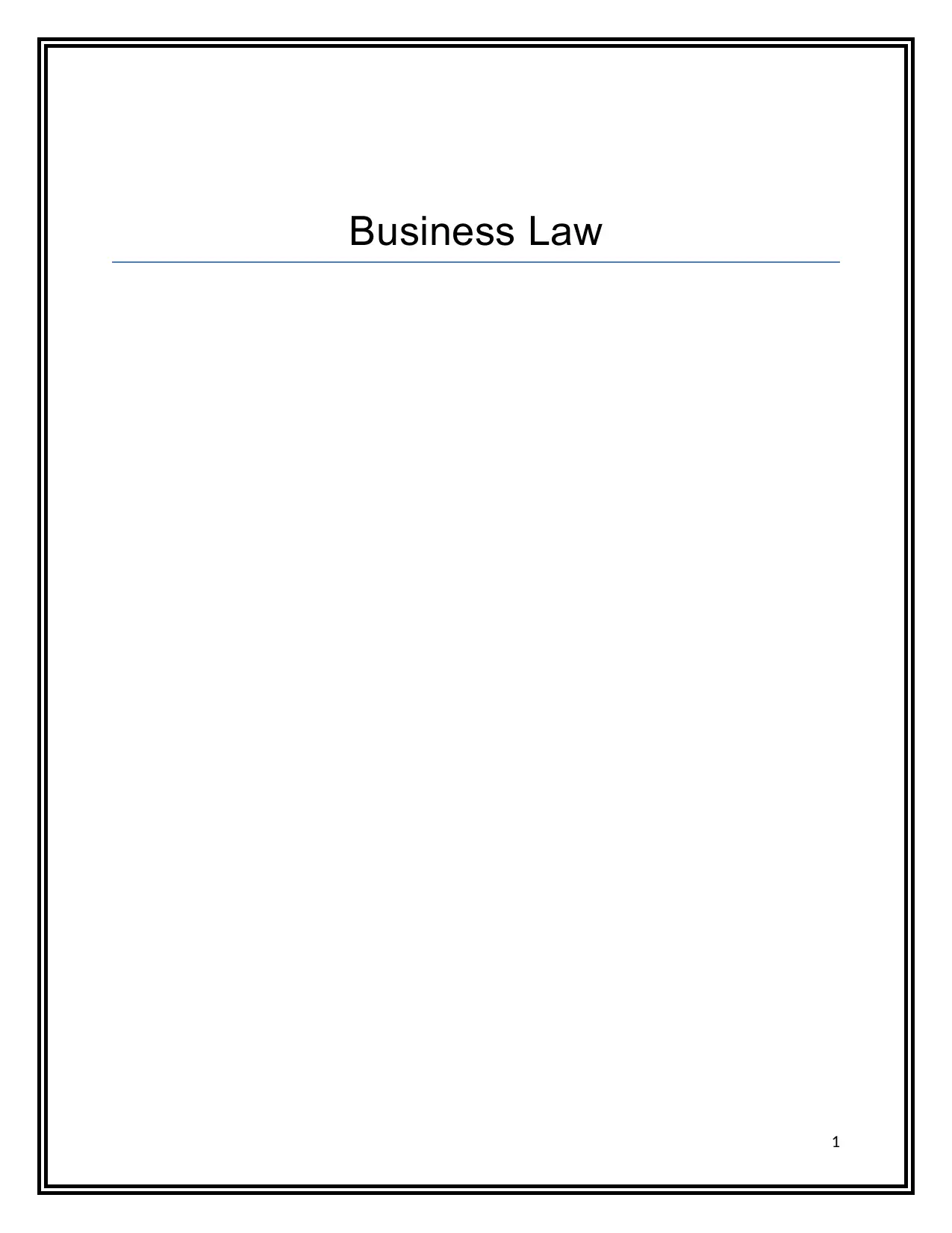
Business Law
1
1
Paraphrase This Document
Need a fresh take? Get an instant paraphrase of this document with our AI Paraphraser
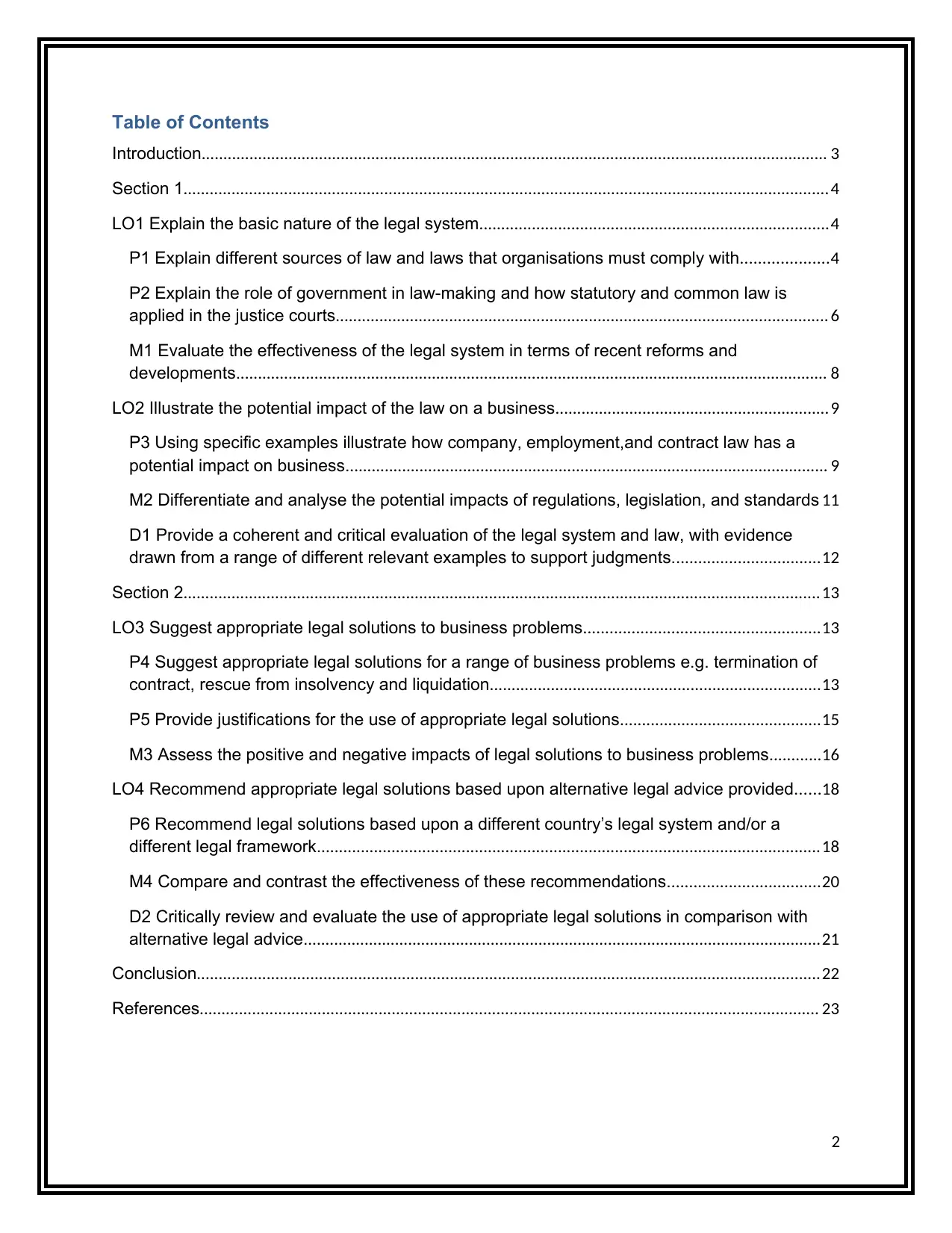
Table of Contents
Introduction................................................................................................................................................ 3
Section 1....................................................................................................................................................4
LO1 Explain the basic nature of the legal system................................................................................4
P1 Explain different sources of law and laws that organisations must comply with....................4
P2 Explain the role of government in law-making and how statutory and common law is
applied in the justice courts................................................................................................................. 6
M1 Evaluate the effectiveness of the legal system in terms of recent reforms and
developments........................................................................................................................................ 8
LO2 Illustrate the potential impact of the law on a business...............................................................9
P3 Using specific examples illustrate how company, employment,and contract law has a
potential impact on business............................................................................................................... 9
M2 Differentiate and analyse the potential impacts of regulations, legislation, and standards 11
D1 Provide a coherent and critical evaluation of the legal system and law, with evidence
drawn from a range of different relevant examples to support judgments..................................12
Section 2..................................................................................................................................................13
LO3 Suggest appropriate legal solutions to business problems......................................................13
P4 Suggest appropriate legal solutions for a range of business problems e.g. termination of
contract, rescue from insolvency and liquidation............................................................................13
P5 Provide justifications for the use of appropriate legal solutions..............................................15
M3 Assess the positive and negative impacts of legal solutions to business problems............16
LO4 Recommend appropriate legal solutions based upon alternative legal advice provided......18
P6 Recommend legal solutions based upon a different country’s legal system and/or a
different legal framework...................................................................................................................18
M4 Compare and contrast the effectiveness of these recommendations...................................20
D2 Critically review and evaluate the use of appropriate legal solutions in comparison with
alternative legal advice.......................................................................................................................21
Conclusion...............................................................................................................................................22
References.............................................................................................................................................. 23
2
Introduction................................................................................................................................................ 3
Section 1....................................................................................................................................................4
LO1 Explain the basic nature of the legal system................................................................................4
P1 Explain different sources of law and laws that organisations must comply with....................4
P2 Explain the role of government in law-making and how statutory and common law is
applied in the justice courts................................................................................................................. 6
M1 Evaluate the effectiveness of the legal system in terms of recent reforms and
developments........................................................................................................................................ 8
LO2 Illustrate the potential impact of the law on a business...............................................................9
P3 Using specific examples illustrate how company, employment,and contract law has a
potential impact on business............................................................................................................... 9
M2 Differentiate and analyse the potential impacts of regulations, legislation, and standards 11
D1 Provide a coherent and critical evaluation of the legal system and law, with evidence
drawn from a range of different relevant examples to support judgments..................................12
Section 2..................................................................................................................................................13
LO3 Suggest appropriate legal solutions to business problems......................................................13
P4 Suggest appropriate legal solutions for a range of business problems e.g. termination of
contract, rescue from insolvency and liquidation............................................................................13
P5 Provide justifications for the use of appropriate legal solutions..............................................15
M3 Assess the positive and negative impacts of legal solutions to business problems............16
LO4 Recommend appropriate legal solutions based upon alternative legal advice provided......18
P6 Recommend legal solutions based upon a different country’s legal system and/or a
different legal framework...................................................................................................................18
M4 Compare and contrast the effectiveness of these recommendations...................................20
D2 Critically review and evaluate the use of appropriate legal solutions in comparison with
alternative legal advice.......................................................................................................................21
Conclusion...............................................................................................................................................22
References.............................................................................................................................................. 23
2
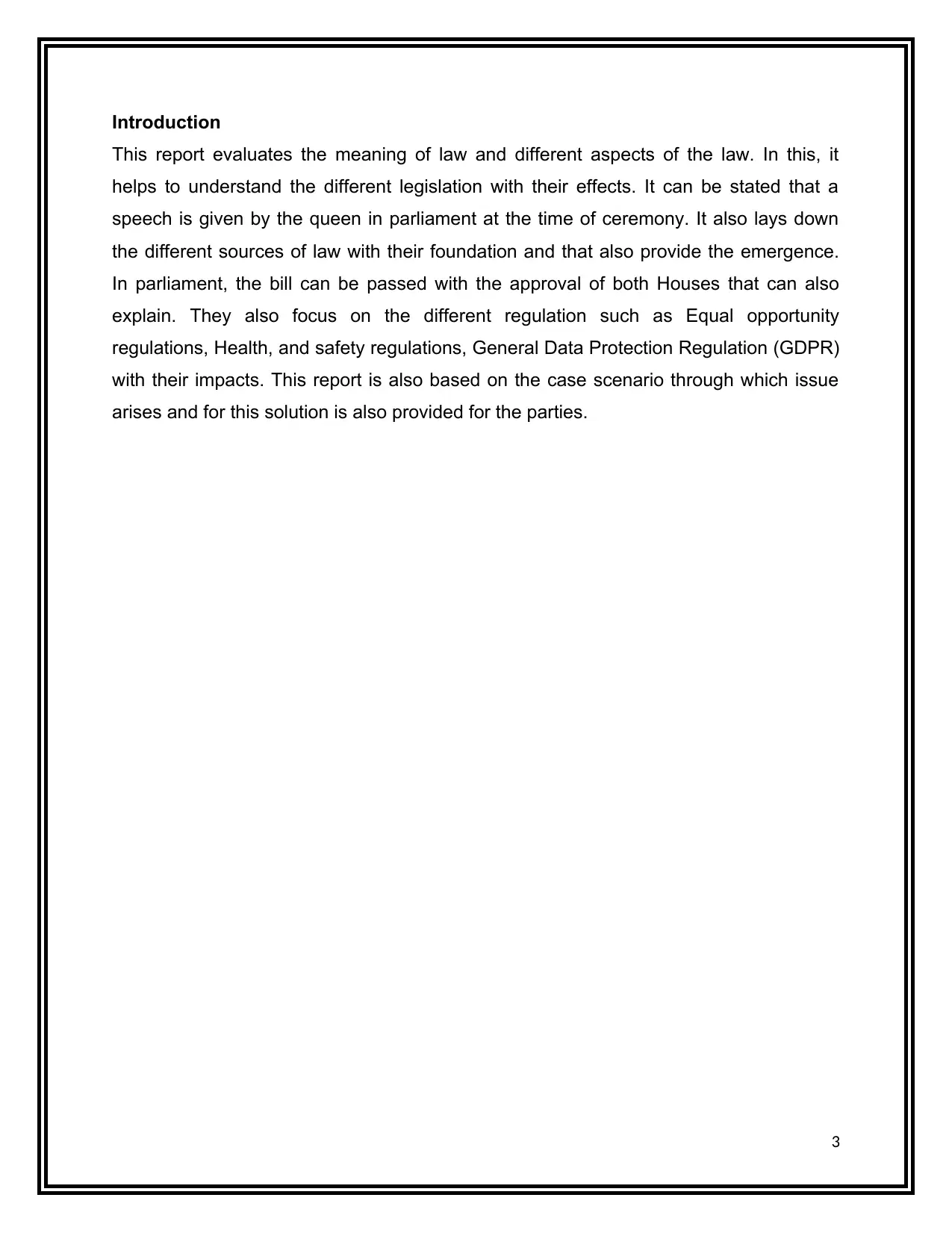
Introduction
This report evaluates the meaning of law and different aspects of the law. In this, it
helps to understand the different legislation with their effects. It can be stated that a
speech is given by the queen in parliament at the time of ceremony. It also lays down
the different sources of law with their foundation and that also provide the emergence.
In parliament, the bill can be passed with the approval of both Houses that can also
explain. They also focus on the different regulation such as Equal opportunity
regulations, Health, and safety regulations, General Data Protection Regulation (GDPR)
with their impacts. This report is also based on the case scenario through which issue
arises and for this solution is also provided for the parties.
3
This report evaluates the meaning of law and different aspects of the law. In this, it
helps to understand the different legislation with their effects. It can be stated that a
speech is given by the queen in parliament at the time of ceremony. It also lays down
the different sources of law with their foundation and that also provide the emergence.
In parliament, the bill can be passed with the approval of both Houses that can also
explain. They also focus on the different regulation such as Equal opportunity
regulations, Health, and safety regulations, General Data Protection Regulation (GDPR)
with their impacts. This report is also based on the case scenario through which issue
arises and for this solution is also provided for the parties.
3
⊘ This is a preview!⊘
Do you want full access?
Subscribe today to unlock all pages.

Trusted by 1+ million students worldwide
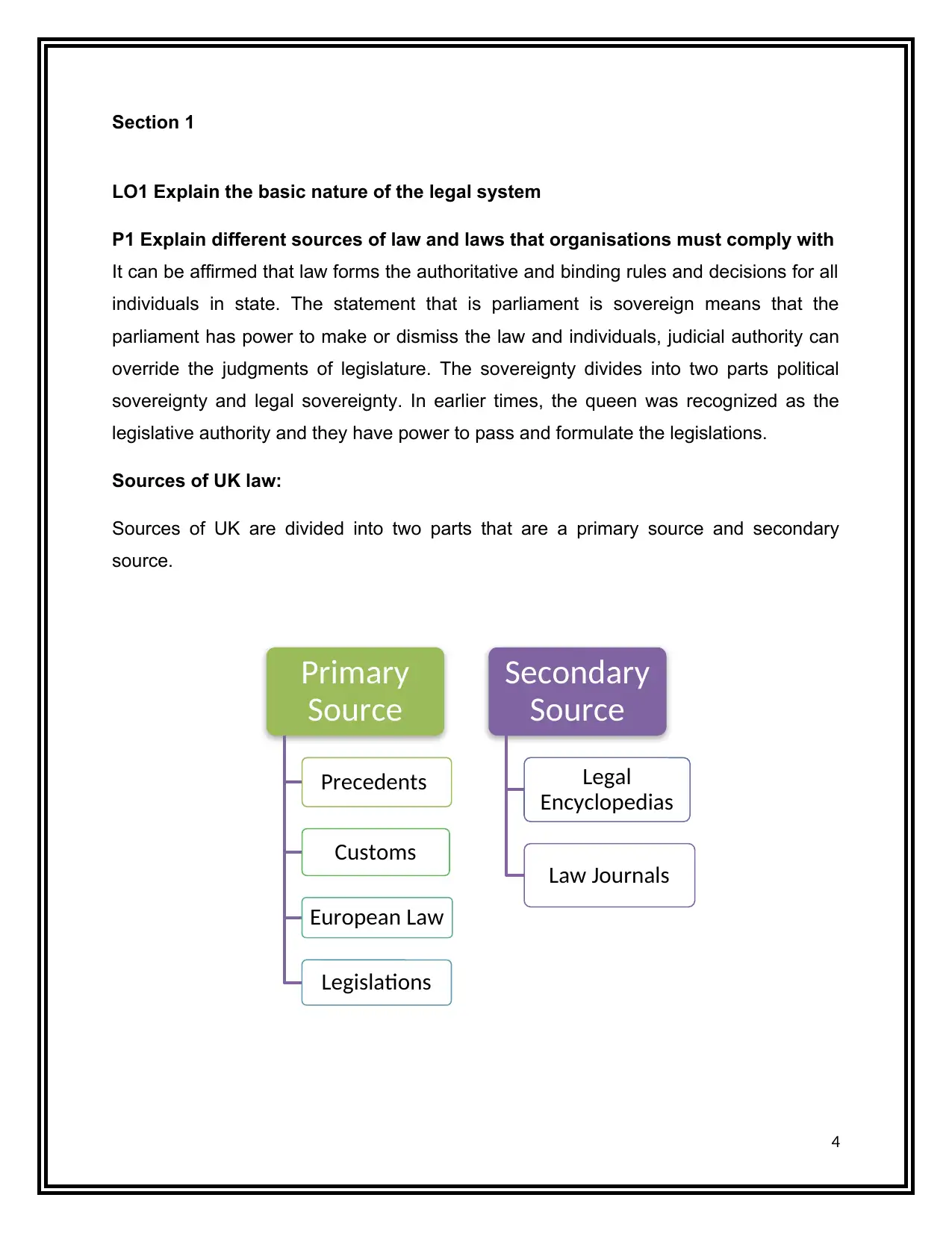
Section 1
LO1 Explain the basic nature of the legal system
P1 Explain different sources of law and laws that organisations must comply with
It can be affirmed that law forms the authoritative and binding rules and decisions for all
individuals in state. The statement that is parliament is sovereign means that the
parliament has power to make or dismiss the law and individuals, judicial authority can
override the judgments of legislature. The sovereignty divides into two parts political
sovereignty and legal sovereignty. In earlier times, the queen was recognized as the
legislative authority and they have power to pass and formulate the legislations.
Sources of UK law:
Sources of UK are divided into two parts that are a primary source and secondary
source.
4
Primary
Source
Precedents
Customs
European Law
Legislations
Secondary
Source
Legal
Encyclopedias
Law Journals
LO1 Explain the basic nature of the legal system
P1 Explain different sources of law and laws that organisations must comply with
It can be affirmed that law forms the authoritative and binding rules and decisions for all
individuals in state. The statement that is parliament is sovereign means that the
parliament has power to make or dismiss the law and individuals, judicial authority can
override the judgments of legislature. The sovereignty divides into two parts political
sovereignty and legal sovereignty. In earlier times, the queen was recognized as the
legislative authority and they have power to pass and formulate the legislations.
Sources of UK law:
Sources of UK are divided into two parts that are a primary source and secondary
source.
4
Primary
Source
Precedents
Customs
European Law
Legislations
Secondary
Source
Legal
Encyclopedias
Law Journals
Paraphrase This Document
Need a fresh take? Get an instant paraphrase of this document with our AI Paraphraser
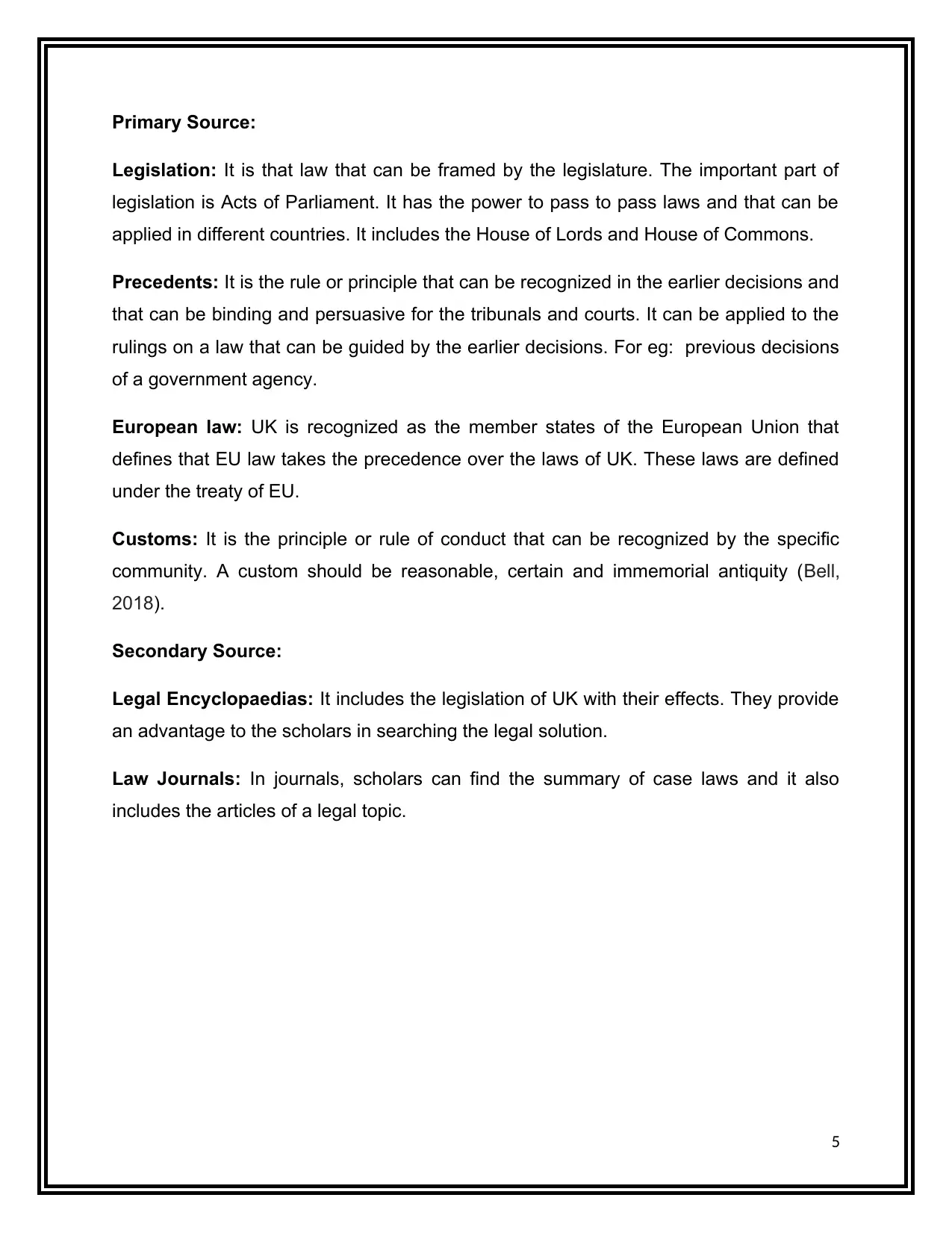
Primary Source:
Legislation: It is that law that can be framed by the legislature. The important part of
legislation is Acts of Parliament. It has the power to pass to pass laws and that can be
applied in different countries. It includes the House of Lords and House of Commons.
Precedents: It is the rule or principle that can be recognized in the earlier decisions and
that can be binding and persuasive for the tribunals and courts. It can be applied to the
rulings on a law that can be guided by the earlier decisions. For eg: previous decisions
of a government agency.
European law: UK is recognized as the member states of the European Union that
defines that EU law takes the precedence over the laws of UK. These laws are defined
under the treaty of EU.
Customs: It is the principle or rule of conduct that can be recognized by the specific
community. A custom should be reasonable, certain and immemorial antiquity (Bell,
2018).
Secondary Source:
Legal Encyclopaedias: It includes the legislation of UK with their effects. They provide
an advantage to the scholars in searching the legal solution.
Law Journals: In journals, scholars can find the summary of case laws and it also
includes the articles of a legal topic.
5
Legislation: It is that law that can be framed by the legislature. The important part of
legislation is Acts of Parliament. It has the power to pass to pass laws and that can be
applied in different countries. It includes the House of Lords and House of Commons.
Precedents: It is the rule or principle that can be recognized in the earlier decisions and
that can be binding and persuasive for the tribunals and courts. It can be applied to the
rulings on a law that can be guided by the earlier decisions. For eg: previous decisions
of a government agency.
European law: UK is recognized as the member states of the European Union that
defines that EU law takes the precedence over the laws of UK. These laws are defined
under the treaty of EU.
Customs: It is the principle or rule of conduct that can be recognized by the specific
community. A custom should be reasonable, certain and immemorial antiquity (Bell,
2018).
Secondary Source:
Legal Encyclopaedias: It includes the legislation of UK with their effects. They provide
an advantage to the scholars in searching the legal solution.
Law Journals: In journals, scholars can find the summary of case laws and it also
includes the articles of a legal topic.
5
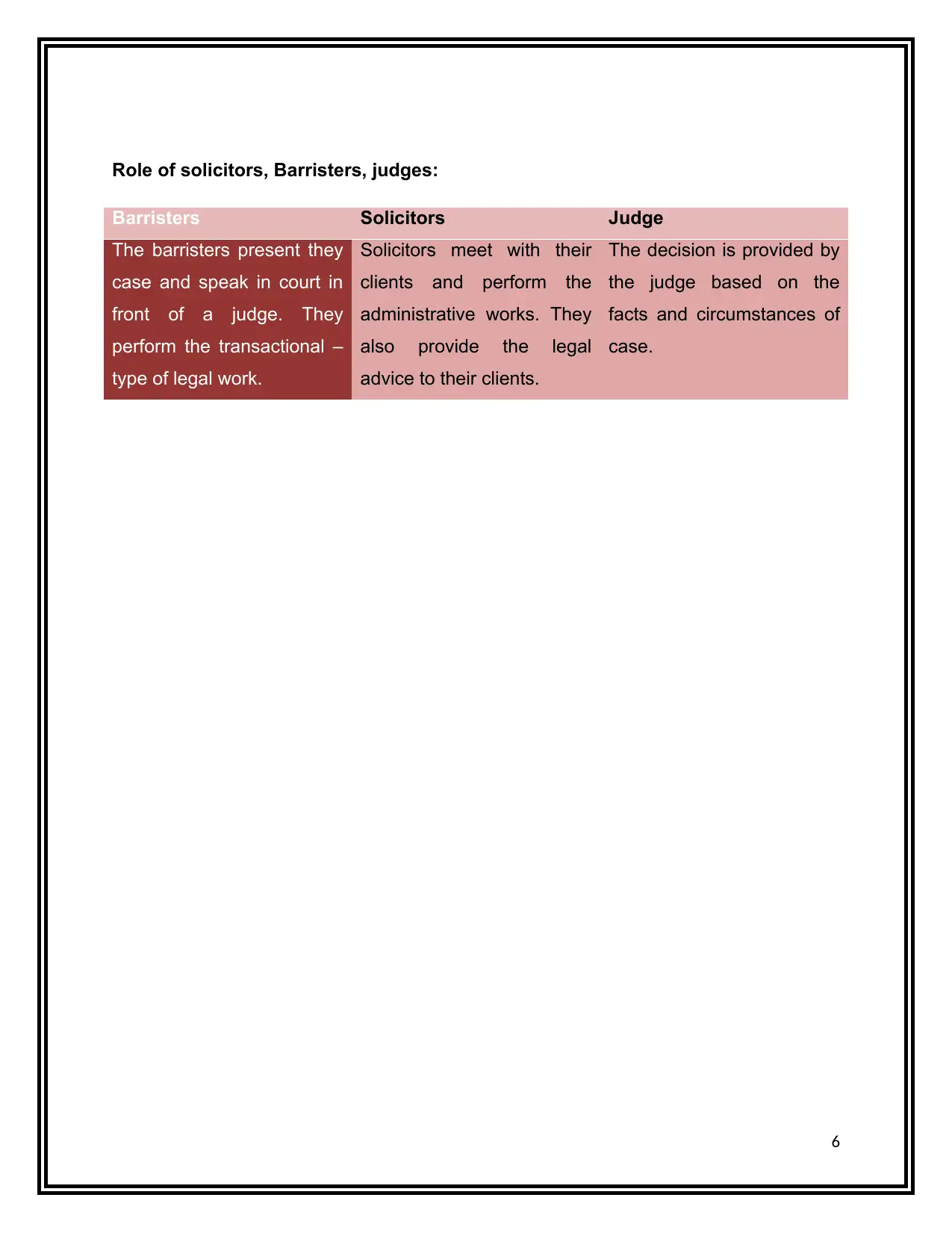
Role of solicitors, Barristers, judges:
Barristers Solicitors Judge
The barristers present they
case and speak in court in
front of a judge. They
perform the transactional –
type of legal work.
Solicitors meet with their
clients and perform the
administrative works. They
also provide the legal
advice to their clients.
The decision is provided by
the judge based on the
facts and circumstances of
case.
6
Barristers Solicitors Judge
The barristers present they
case and speak in court in
front of a judge. They
perform the transactional –
type of legal work.
Solicitors meet with their
clients and perform the
administrative works. They
also provide the legal
advice to their clients.
The decision is provided by
the judge based on the
facts and circumstances of
case.
6
⊘ This is a preview!⊘
Do you want full access?
Subscribe today to unlock all pages.

Trusted by 1+ million students worldwide
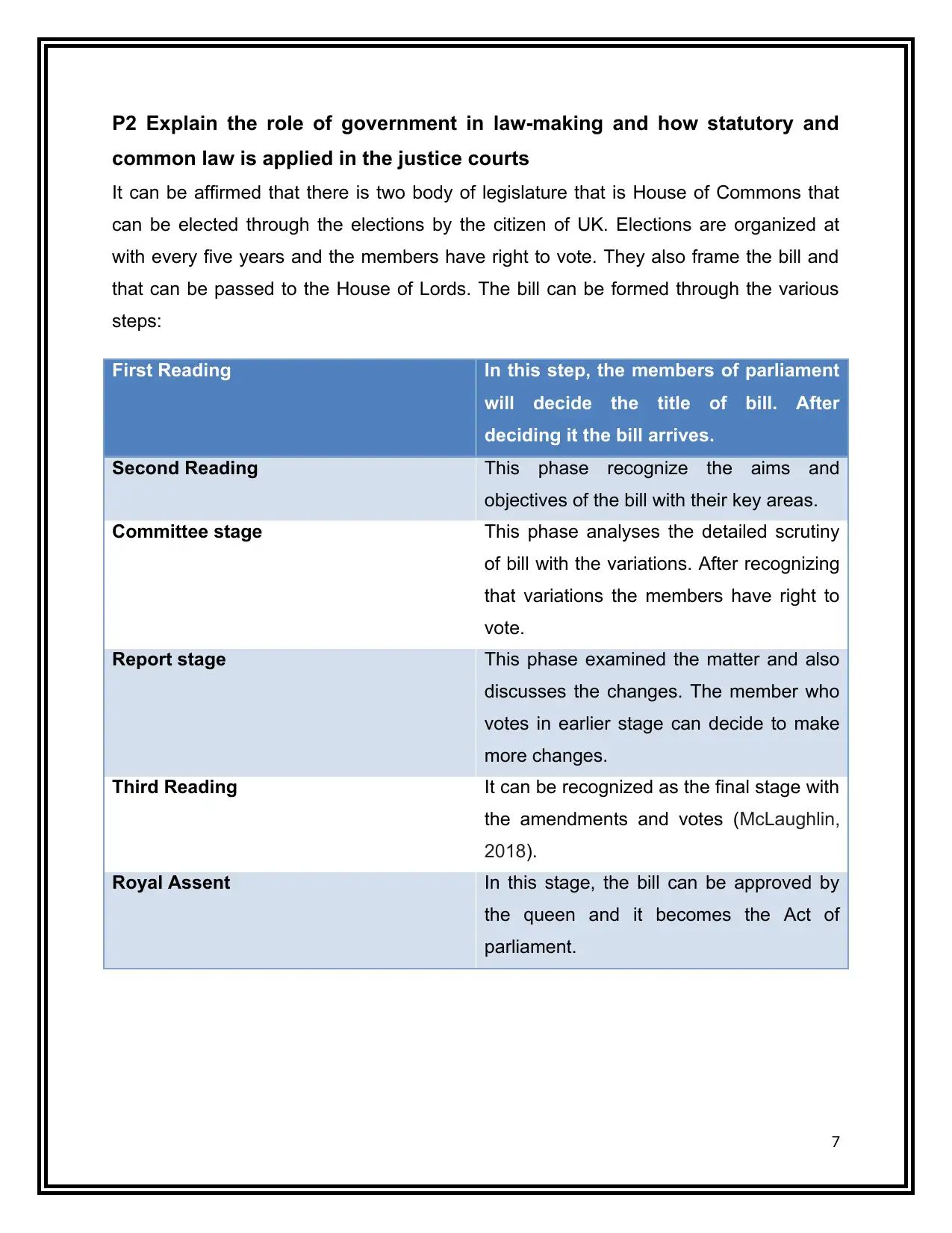
P2 Explain the role of government in law-making and how statutory and
common law is applied in the justice courts
It can be affirmed that there is two body of legislature that is House of Commons that
can be elected through the elections by the citizen of UK. Elections are organized at
with every five years and the members have right to vote. They also frame the bill and
that can be passed to the House of Lords. The bill can be formed through the various
steps:
First Reading In this step, the members of parliament
will decide the title of bill. After
deciding it the bill arrives.
Second Reading This phase recognize the aims and
objectives of the bill with their key areas.
Committee stage This phase analyses the detailed scrutiny
of bill with the variations. After recognizing
that variations the members have right to
vote.
Report stage This phase examined the matter and also
discusses the changes. The member who
votes in earlier stage can decide to make
more changes.
Third Reading It can be recognized as the final stage with
the amendments and votes (McLaughlin,
2018).
Royal Assent In this stage, the bill can be approved by
the queen and it becomes the Act of
parliament.
7
common law is applied in the justice courts
It can be affirmed that there is two body of legislature that is House of Commons that
can be elected through the elections by the citizen of UK. Elections are organized at
with every five years and the members have right to vote. They also frame the bill and
that can be passed to the House of Lords. The bill can be formed through the various
steps:
First Reading In this step, the members of parliament
will decide the title of bill. After
deciding it the bill arrives.
Second Reading This phase recognize the aims and
objectives of the bill with their key areas.
Committee stage This phase analyses the detailed scrutiny
of bill with the variations. After recognizing
that variations the members have right to
vote.
Report stage This phase examined the matter and also
discusses the changes. The member who
votes in earlier stage can decide to make
more changes.
Third Reading It can be recognized as the final stage with
the amendments and votes (McLaughlin,
2018).
Royal Assent In this stage, the bill can be approved by
the queen and it becomes the Act of
parliament.
7
Paraphrase This Document
Need a fresh take? Get an instant paraphrase of this document with our AI Paraphraser
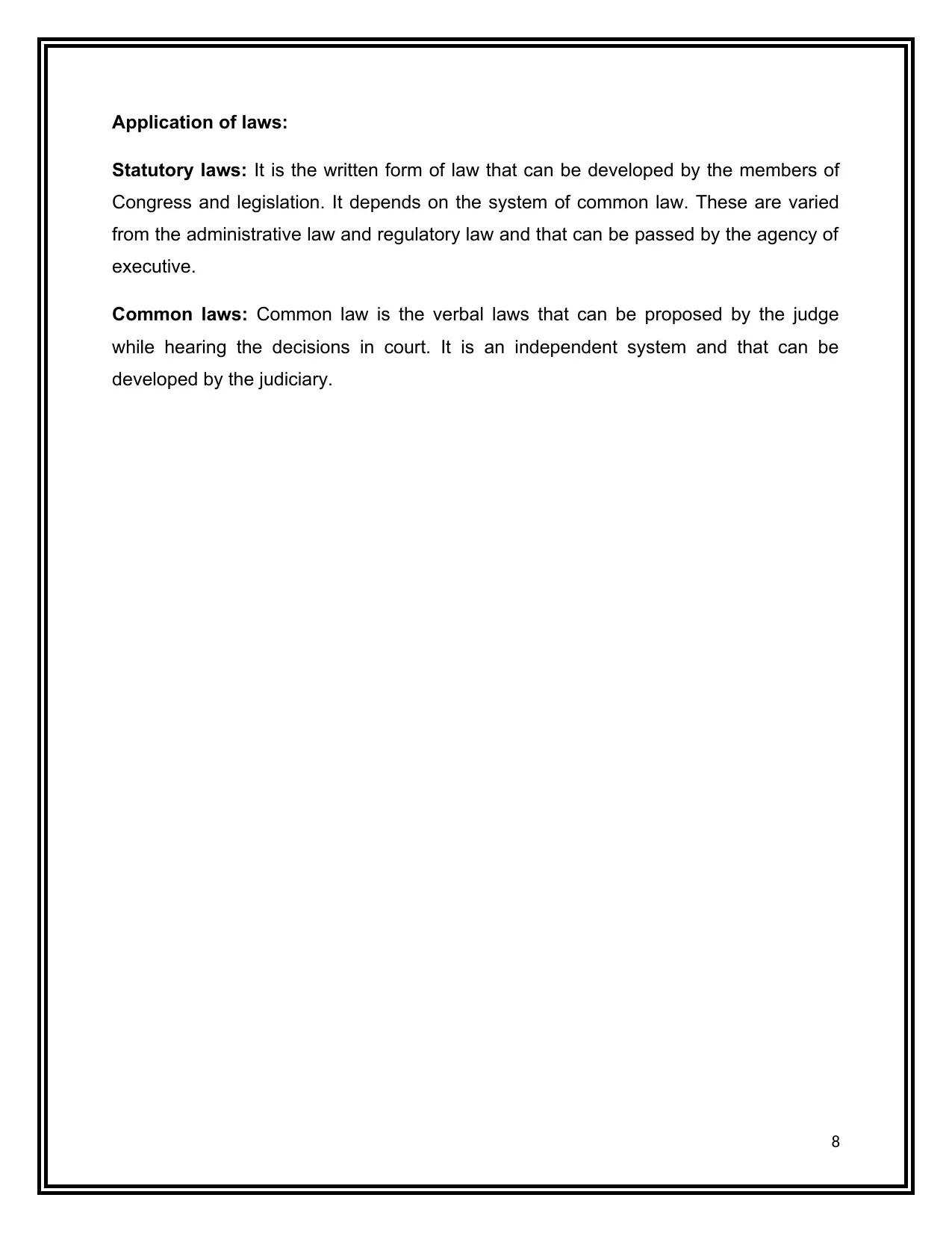
Application of laws:
Statutory laws: It is the written form of law that can be developed by the members of
Congress and legislation. It depends on the system of common law. These are varied
from the administrative law and regulatory law and that can be passed by the agency of
executive.
Common laws: Common law is the verbal laws that can be proposed by the judge
while hearing the decisions in court. It is an independent system and that can be
developed by the judiciary.
8
Statutory laws: It is the written form of law that can be developed by the members of
Congress and legislation. It depends on the system of common law. These are varied
from the administrative law and regulatory law and that can be passed by the agency of
executive.
Common laws: Common law is the verbal laws that can be proposed by the judge
while hearing the decisions in court. It is an independent system and that can be
developed by the judiciary.
8
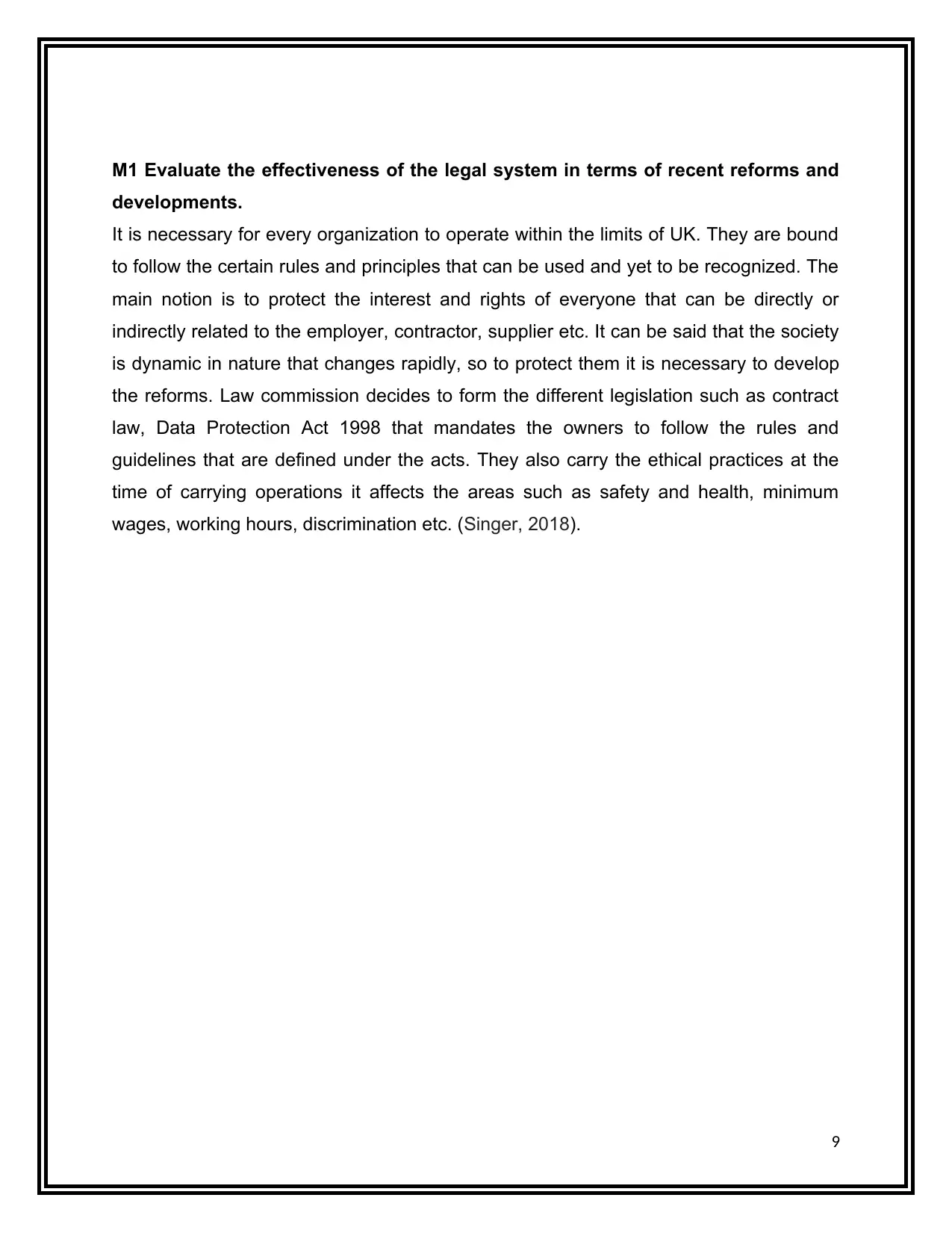
M1 Evaluate the effectiveness of the legal system in terms of recent reforms and
developments.
It is necessary for every organization to operate within the limits of UK. They are bound
to follow the certain rules and principles that can be used and yet to be recognized. The
main notion is to protect the interest and rights of everyone that can be directly or
indirectly related to the employer, contractor, supplier etc. It can be said that the society
is dynamic in nature that changes rapidly, so to protect them it is necessary to develop
the reforms. Law commission decides to form the different legislation such as contract
law, Data Protection Act 1998 that mandates the owners to follow the rules and
guidelines that are defined under the acts. They also carry the ethical practices at the
time of carrying operations it affects the areas such as safety and health, minimum
wages, working hours, discrimination etc. (Singer, 2018).
9
developments.
It is necessary for every organization to operate within the limits of UK. They are bound
to follow the certain rules and principles that can be used and yet to be recognized. The
main notion is to protect the interest and rights of everyone that can be directly or
indirectly related to the employer, contractor, supplier etc. It can be said that the society
is dynamic in nature that changes rapidly, so to protect them it is necessary to develop
the reforms. Law commission decides to form the different legislation such as contract
law, Data Protection Act 1998 that mandates the owners to follow the rules and
guidelines that are defined under the acts. They also carry the ethical practices at the
time of carrying operations it affects the areas such as safety and health, minimum
wages, working hours, discrimination etc. (Singer, 2018).
9
⊘ This is a preview!⊘
Do you want full access?
Subscribe today to unlock all pages.

Trusted by 1+ million students worldwide
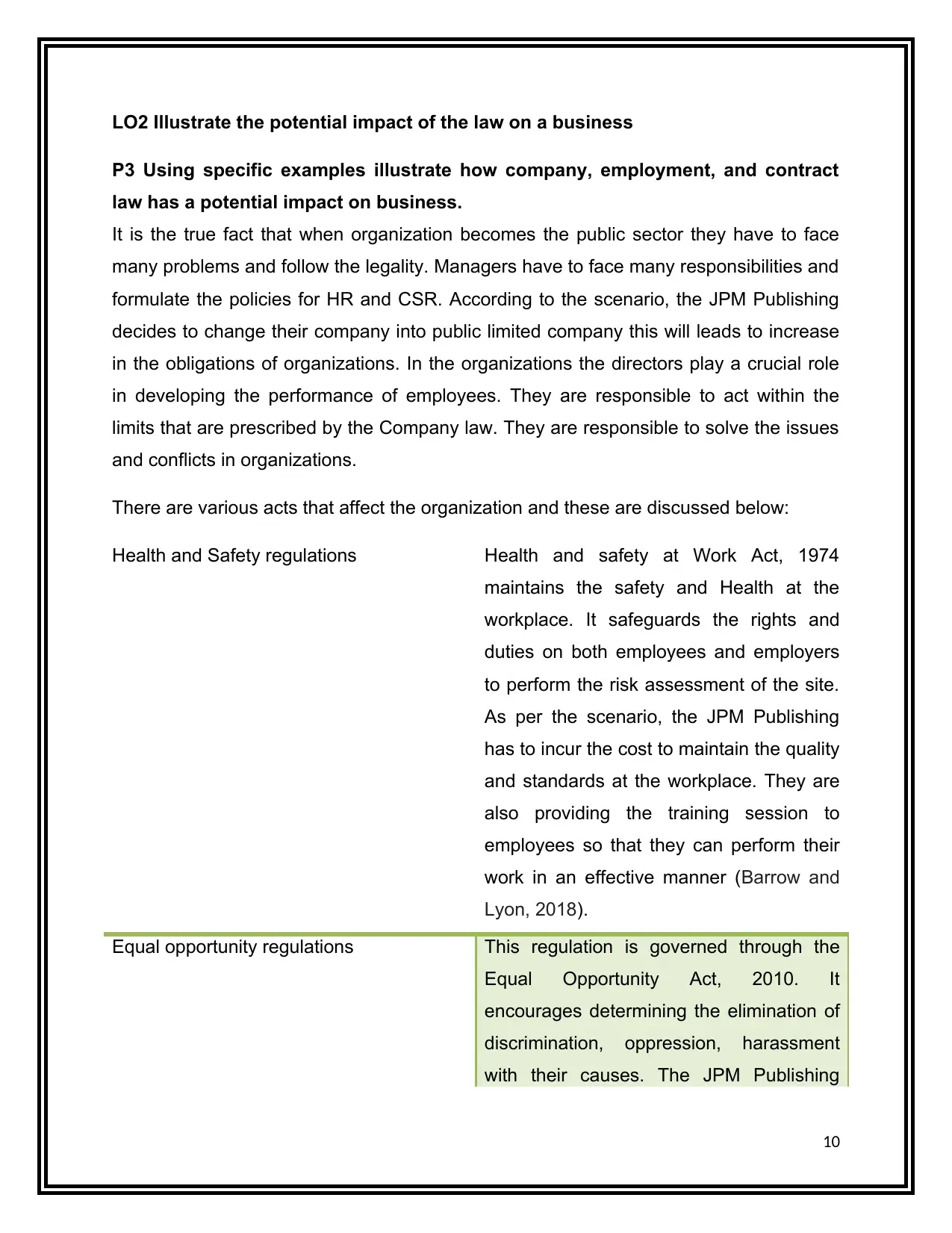
LO2 Illustrate the potential impact of the law on a business
P3 Using specific examples illustrate how company, employment, and contract
law has a potential impact on business.
It is the true fact that when organization becomes the public sector they have to face
many problems and follow the legality. Managers have to face many responsibilities and
formulate the policies for HR and CSR. According to the scenario, the JPM Publishing
decides to change their company into public limited company this will leads to increase
in the obligations of organizations. In the organizations the directors play a crucial role
in developing the performance of employees. They are responsible to act within the
limits that are prescribed by the Company law. They are responsible to solve the issues
and conflicts in organizations.
There are various acts that affect the organization and these are discussed below:
Health and Safety regulations Health and safety at Work Act, 1974
maintains the safety and Health at the
workplace. It safeguards the rights and
duties on both employees and employers
to perform the risk assessment of the site.
As per the scenario, the JPM Publishing
has to incur the cost to maintain the quality
and standards at the workplace. They are
also providing the training session to
employees so that they can perform their
work in an effective manner (Barrow and
Lyon, 2018).
Equal opportunity regulations This regulation is governed through the
Equal Opportunity Act, 2010. It
encourages determining the elimination of
discrimination, oppression, harassment
with their causes. The JPM Publishing
10
P3 Using specific examples illustrate how company, employment, and contract
law has a potential impact on business.
It is the true fact that when organization becomes the public sector they have to face
many problems and follow the legality. Managers have to face many responsibilities and
formulate the policies for HR and CSR. According to the scenario, the JPM Publishing
decides to change their company into public limited company this will leads to increase
in the obligations of organizations. In the organizations the directors play a crucial role
in developing the performance of employees. They are responsible to act within the
limits that are prescribed by the Company law. They are responsible to solve the issues
and conflicts in organizations.
There are various acts that affect the organization and these are discussed below:
Health and Safety regulations Health and safety at Work Act, 1974
maintains the safety and Health at the
workplace. It safeguards the rights and
duties on both employees and employers
to perform the risk assessment of the site.
As per the scenario, the JPM Publishing
has to incur the cost to maintain the quality
and standards at the workplace. They are
also providing the training session to
employees so that they can perform their
work in an effective manner (Barrow and
Lyon, 2018).
Equal opportunity regulations This regulation is governed through the
Equal Opportunity Act, 2010. It
encourages determining the elimination of
discrimination, oppression, harassment
with their causes. The JPM Publishing
10
Paraphrase This Document
Need a fresh take? Get an instant paraphrase of this document with our AI Paraphraser
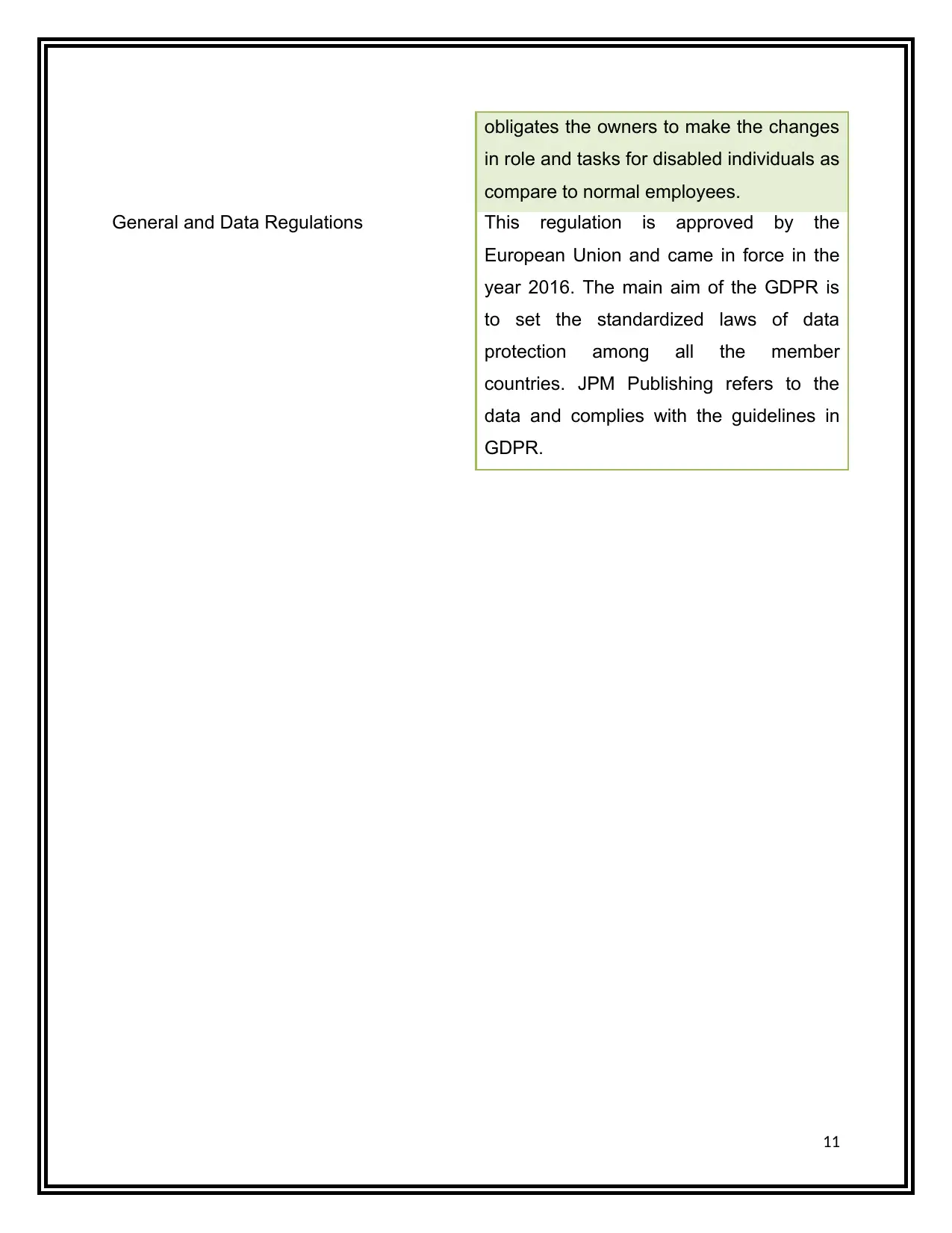
obligates the owners to make the changes
in role and tasks for disabled individuals as
compare to normal employees.
General and Data Regulations This regulation is approved by the
European Union and came in force in the
year 2016. The main aim of the GDPR is
to set the standardized laws of data
protection among all the member
countries. JPM Publishing refers to the
data and complies with the guidelines in
GDPR.
11
in role and tasks for disabled individuals as
compare to normal employees.
General and Data Regulations This regulation is approved by the
European Union and came in force in the
year 2016. The main aim of the GDPR is
to set the standardized laws of data
protection among all the member
countries. JPM Publishing refers to the
data and complies with the guidelines in
GDPR.
11
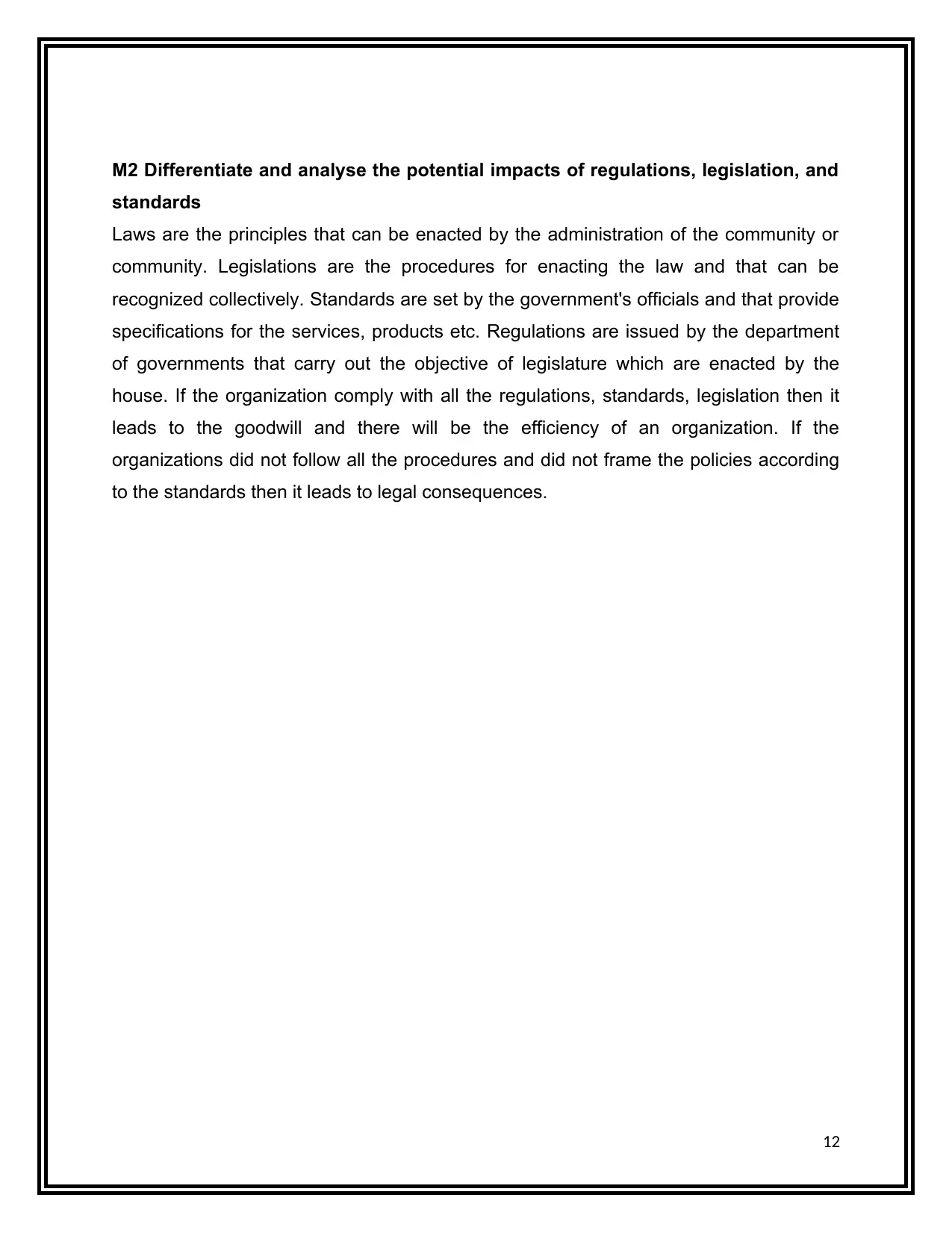
M2 Differentiate and analyse the potential impacts of regulations, legislation, and
standards
Laws are the principles that can be enacted by the administration of the community or
community. Legislations are the procedures for enacting the law and that can be
recognized collectively. Standards are set by the government's officials and that provide
specifications for the services, products etc. Regulations are issued by the department
of governments that carry out the objective of legislature which are enacted by the
house. If the organization comply with all the regulations, standards, legislation then it
leads to the goodwill and there will be the efficiency of an organization. If the
organizations did not follow all the procedures and did not frame the policies according
to the standards then it leads to legal consequences.
12
standards
Laws are the principles that can be enacted by the administration of the community or
community. Legislations are the procedures for enacting the law and that can be
recognized collectively. Standards are set by the government's officials and that provide
specifications for the services, products etc. Regulations are issued by the department
of governments that carry out the objective of legislature which are enacted by the
house. If the organization comply with all the regulations, standards, legislation then it
leads to the goodwill and there will be the efficiency of an organization. If the
organizations did not follow all the procedures and did not frame the policies according
to the standards then it leads to legal consequences.
12
⊘ This is a preview!⊘
Do you want full access?
Subscribe today to unlock all pages.

Trusted by 1+ million students worldwide
1 out of 24
Related Documents
Your All-in-One AI-Powered Toolkit for Academic Success.
+13062052269
info@desklib.com
Available 24*7 on WhatsApp / Email
![[object Object]](/_next/static/media/star-bottom.7253800d.svg)
Unlock your academic potential
Copyright © 2020–2025 A2Z Services. All Rights Reserved. Developed and managed by ZUCOL.





